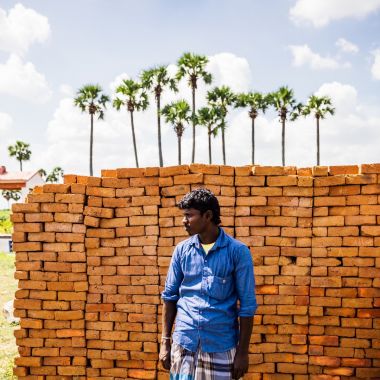How Christians can help end modern slavery this Lent

There's never been a more important time to take action against modern slavery – as Christians, as citizens and as consumers. But how can we do this in the midst of a global pandemic?
In 2021, the scale of the problem is more apparent than ever. With over 40 million people already trapped in slavery, the situation is predicted to worsen under the impact of Covid-19, which has driven more people into extreme poverty and therefore increased their vulnerability to traffickers.
It's a problem that hits closer to home than many of us realise, with numerous items we use every day, such as coffee, chocolate, rice and seafood, at high risk of having slavery in their supply chains.
Frontline workers for International Justice Mission, who work globally to protect people in poverty from slavery and trafficking, have seen the human cost of this first-hand. Take, for example, the story of a man who was trafficked from Myanmar to be forced to work on a Thai fishing boat, with no idea when he would be able to return home. Until, thankfully, IJM was able to support Thailand's Department of Special Investigation and bring him to safety.
Thailand is one of the world's largest exporters of seafood, which reflects a dark reality for migrant workers such as the rescued man: 2017 research by Issara Institute and IJM showed that up to 76% of migrant fishing workers are in debt bondage and up to 38% have been trafficked. Despite impressive efforts by the Thai government since then, many migrant workers are still being exploited.
When he saw the police speedboat approach, his face lit up. He was reunited with his wife and two-month-old baby in a safe house the same day, and received continued support from the IJM aftercare team whilst in a government protection centre for victims of trafficking.
For many children and adults in his situation, help has yet to arrive – and, without joint action from governments, corporates and consumers, the issue of slavery in supply chains will grow worse this year with the impact of the pandemic.
But there are already promising signs of change occurring: recent research from Accenture found that 60% of consumers reported making more ethical, sustainable or environmentally friendly purchases during 2020, and 90% intended to continue doing so. It seems the tide may finally be turning. As Christians, we are particularly called to think about these issues as following Jesus and pursuing justice are inextricably linked. Whilst slavery and forced labour are complex problems, there are many ways we can make an impact.
Here are four simple ways we can create change for people trapped in slavery this Lent:
1. Get educated: you can learn more about the issue of modern slavery and how it impacts the consumer products we use every day, by signing up for IJM's Make #SlaveFree Normal campaign. We'll send you regular videos straight to your phone, containing insights from survivors of slavery, frontline workers, business leaders, activists and influencers, who will share knowledge on how best to take action.
2. Change your habits: look out for brands that are ethically produced and find out what – if any – actions they are taking via their modern slavery statements on their websites.
3. Use your voice: as individuals and as a collective, we have the power to influence corporate and government behaviour through advocating for transparency in supply chains, fair pay for workers, and laws which protect the most vulnerable. Why not ask some of your favourite brands and retailers what they're doing to tackle labour exploitation? How have these efforts been impacted by the pandemic?
4. Pray: you can raise your voice to the God of freedom and hope and ask that he continues to bring justice and healing to victims of slavery around the world. When you sign up to Make #SlaveFree Normal, we'll send you resources to help you pray: and you can receive regular prayer updates by signing up to become an IJM Prayer Partner.
It can be easy to underestimate the influence we have as Christians, citizens and consumers to make the world a fairer and safer place for people who are vulnerable to, and survivors of, modern slavery. At IJM, we would love to encourage you that you do have the power to make a meaningful impact – why not use Lent as the starting point?
David Westlake is the CEO of IJM UK, which works worldwide to end slavery.











